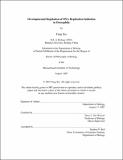Developmental regulation of DNA replication initiation in Drosophila
Author(s)
Xie, Fang, Ph. D. Massachusetts Institute of Technology
DownloadFull printable version (1.183Mb)
Alternative title
Developmental regulation of deoxyribonucleic acid replication initiation in Drosophila
Other Contributors
Massachusetts Institute of Technology. Dept. of Biology.
Advisor
Terry L. Orr-Weaver.
Terms of use
Metadata
Show full item recordAbstract
Developmental gene amplification in the ovarian follicle cells of Drosophila provides a powerful system for the study of metazoan DNA replication. Amplification produces 100kb gradients of amplified DNA through repeated rounds of origin firing and bidirectional movement of replication forks from these origins. The Drosophila Follicle Cell Amplicon at the cytological location 62D, DAFC-62D, is uniquely regulated, with two separate rounds of amplification in developmental stages 10 and 13 of egg chamber development. We investigated mechanisms that control the unusual timing of DAFC-62D origin activation. We first defined origin sequences in DAFC-62D by analyzing the amount of nascent replicative DNA across this amplicon. Surprisingly, the origin coincides with the coding region of a gene named yellow-g2. ORC2 localizes to the origin, as well as two other sites that do not confer origin activity. Both ORC2 and MCM2-7 display differential association with these sequences, corresponding to the two rounds of amplification. All three elements, dispersed in a 7kb central amplified region, are required for either round of DAFC-62D amplification, because deleting any one completely abolished amplification in transposon experiments. Preceded by transcription yellow-g2 in stage 12, the late round of origin firing was ablated by the RNAPII inhibitor a-amanitin. This effect was absent from other amplicons and insulated transposons, and was stage-13 specific for amplification at either the endogenous DAFC-62D or heterologous transposons that did not have functional insulators. Therefore amplification at DAFC-62D in late follicle cell differentiation depends on transcription in cis. Molecularly, blocking RNAPII transcription compromises MCM2-7 recruitment. (cont.) Additional transposon and histone modification analyses confirmed the involvement of RNAPII in amplification control, which may be facilitated by favorable chromatin structure. This work provides insights in developmental regulation of origin firing, revealing one mechanism for initiation of metazoan DNA replication: recruitment of MCM2-7 by RNA polymerase II transcription.
Description
Thesis (Ph. D.)--Massachusetts Institute of Technology, Dept. of Biology, 2007. This electronic version was submitted by the student author. The certified thesis is available in the Institute Archives and Special Collections. Includes bibliographical references.
Date issued
2007Department
Massachusetts Institute of Technology. Department of BiologyPublisher
Massachusetts Institute of Technology
Keywords
Biology.